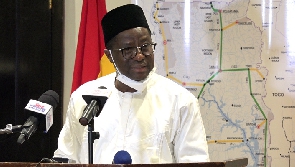Opinions of Friday, 19 December 2014
Columnist: N'Arziki, Masara
Wrongful prosecution of farmers in the Sissala East and West districts
Wrongful prosecution of farmers in the Sissala East and West districts by Masara N'Arziki
In recent times, maize production has witnessed an increase because of the release of several hybrids and other synthetic varieties. Despite the increased production over the years, Ghana still has supply deficit and make up for the shortage through imports. Masara N'Arziki, the culmination of industrial maize farmers, was initiated in 2005 by Wienco Ghana Limited to minimize or even eliminate the supply deficit. The main vision of Masara N' Arziki (Hausa phrase meaning maize for prosperity) is to support maize farmers to do what they are doing much better and to help them to get more income through the use of improved technology that increases production of their farms.
The programme package consists of the providing farmers with credit in kind in the form of hybrid maize seeds, fertilizers, herbicides, insecticides, spraying equipment and innovative farm implements on credit. Technical advisory and training services are included and these training programmes are to introduce farmers to the most improved methods of maize production. After harvest, farmers are in turn expected to pay back the credit. The repayment is a specified quantity of maize grain farmers are to provide. The quantity to be collected is to be agreed upon between the farmers and Masara N'Arziki at the start of the farming season. The company also promised buying any excess maize from the farmers at competitive market prices.
Since its inception, Masara N'Arziki has therefore contributed positively through increased food production and income especially to the farmers in its operational areas. Despite the achievement of this farmer association especially in the Sissala East and West districts of the Upper West Region, a lot of inconsistencies have happened. These inconsistencies became apparent in the 2012 farming season but they actually peaked and subsequently exerted a heavy toll on farmers in the 2013 farming season. This write-up, strictly focusing on the inconsistencies that occurred in these last two farming seasons, aims to draw the attention of Masara N'Arziki to sincerely reconsider its approaches in dealing with farmers.
The first inconsistency which traces its roots back to the arrival of Masara N’Arziki in the Sissala East and West districts is the manner in which the group demands farmers to pay back. The group claimed that it is only in the event of drought that it will not force farmers to pay back the credit during that season. This demand at first seems sensible because farmers do play a lot of dirty tricks on creditors. However, farming especially cultivating crops using hybrid varieties involves other risks far beyond farmers’ control. Apart from drought, some of these risks include bushfires, outbreak of pests and diseases and excessive rains leading to flooding.
With Masara N’Arziki Farmers Association, the magnitude of these risk factors increases because hybrid varieties require more intensive care than the landraces and synthetic varieties which the local farmers are used to growing. For example, a delay in the application of fertilizer even for a week can reduce yield drastically. The aforementioned risks, acting alone or in tandem, can prevent even the most hardworking and experienced farmers from getting good harvest. These disasters may even lead to total crop failure. When any or some of these disasters struck leading to a poor harvest, common sense suggests that a creditor must no longer force the farmers to pay back the credit; thus, the only viable option is to resupply the farmers with credit the following season for them to cultivate the crop and then pay both the current and previous debt.
And to ascertain whether a poor harvest is the farmers’ fault or is due to a disaster beyond farmers’ control, Masara N’Arziki itself has technical officers supervising all the farmers’ field. With the just-ended season in particular, the rains started late delaying the onset of the farming season. The inputs especially the fertilizers arrived late (specify time ploughing, of arrival of seeds, fertilizers, herbicides and/or insecticides). The fertilizers applied by many farmers caked on the field because of drought. The field supervisors of the Masara N’Arziki were duly informed and they visited all the affected farmers’ farms and also saw the caked fertilizers and drought-stricken crops.
For those farmers whose fertilizers dissolved, the erratic rainfall pattern especially at the tasselling and silking and/or milking stage drastically reduced the maize yield. The physiology of the development of maize and filling of its grains are strictly dependant on moisture availability at certain critical stage of growth particular at the milking stage. Thus, drought condition at this stage was the principal factor that led to the poor harvest. Technically, grains produced by drought-ridden maize are usually weightless. (Masara N'Arziki buys on weight basis.) Again, both the field supervisors and the chief farmer Karim Nanyua were fully informed and they are both fully aware of these misfortunes.
The direct and inevitable consequence of these unfavourable conditions was poor harvest. Unfortunately, Masara N’Arziki is prosecuting the poor farmers to pay back its credit. Contrastingly, drought happens to be the only condition that that group said it would allow farmers to cultivate the crop during the following season and then pay back. The question then is, ‘Why is the company prosecuting the poor farmers to pay the maize when it is fully aware that the poor harvest was caused by factors beyond their control?’ As this write-up is being compiled, about ten (10) of farmers have been locked up at Tumu Police Station since January 10, 2014. Many of the affected farmers have since fled their homes leaving their wives and children.
A quick check of the company’s record will show clearly that during the last two seasons (2011 & 2012) when the weather conditions were favourable, nearly every farmer was able to pay back and they still got a lot of income. Because of this year’s losses, the farmers themselves wholeheartedly sympathize with company and are ever ready to grow the crop during the next farming season to pay back. Therefore, their prosecuting is unmerited and we are strongly appealing to Masara N’Arziki revoke that decisions as urgently as possible.
The second and most suspicious inconsistency of Masara N’Arziki is its refusal to timely disclose the exact quantity of maize the farmers are to pay back. As part of its own activities, Masara N’Arziki promised that it will always sit down with the farmers at the start of the season to negotiate or at least to inform them exactly how many minibags of maize it will collect per each of the 5-arce land. Even upon persistent requests from farmers, the company never discloses this quantity right from the beginning of the farming. Simply computation of the total cost of inputs supplied which the farmers think will be the basis for the quantity to be collected never matters to the company. It only discloses the quantity to be collected at harvest time—this tactics in itself amounts of exploitation. The resource-poor status of the farmers is therefore what the company is capitalizing on to exploit them.
Another inconsistency is the manner in which the company keeps changing its buying procedures. It claims that its minibag is 50 kg. This year, it demands 100 minibags per each 5-acre land; two of the minibags will overfill a standard bag at the local markets. Getting towards harvesting, the company announced that it will be buying 51 kg per minibag, instead of the initially agreed upon 50 kg. This extra kilo per bag generated a lot of controversy. Using its power and monopoly, the company is currently buying 51 kg per minibag. This extra kilo means that per every 5-arce land, it will get extra 100 kg of maize. This extra maize alone which can overfill a standard bag will be selling around fifty cedis (GH ¢50.00).
Once the farmers have paid the company’s debt, the agreement is that they can sell the extra maize to the company or not. And the farmers do not usually sell the extra ones to it because its buying prices are far lower than the local market prices—this already contravenes the vision of the company. Also, they do not pay quickly once they take the maize from the farmers. Surprisingly, the company now demands that, every farmer who wish to farm next year must supply additional 50 bags (100 bags for the 5-arce land and 50 bags on credit to the company). As usual, the company then claims it will come and pay the extra 50 bags later. The question is, ‘when?’ . If a farmer is not able provider the additional 50 bags won't be allow to farm again.
Plausibly, the dubious aspect is that the current market price for the minibag is about twenty-four or twenty-five Ghana cedis (GH ¢25.00) but the company is buying it at just twenty Ghana cedis (GH ¢20.00). Thus, the company gets extra four or five Ghana cedis per minibag accumulating to between four and five hundred Ghana cedis (GH ¢400 to 500.00) per each 5-acre land. In addition, it gets 100 kg of maize per the same and area due to the extra kilo per each of the 100 bags. In total, the unfair or previously undefined marketing strategies alone will give the company an amount closer to six hundred Ghana cedis per each 5-acre land. Equally unknown and worrisome is whether the scales used for buying the maize grains are standardized.
By this write-up, I'm appealing to the Masara N’Arziki to put a human face onto its activities and then stop prosecuting the poor farmers. Also, I make the following recommendations to the company:
1. The quantity of maize to be collected at the end of the season must be discussed and agreed on at the beginning of the farming season;
2. The peculiar dependence of farming on the weather be noted and included in the contract with farmers; a disaster beyond farmers’ control must not only automatically exempt them from any prosecutions but should also qualify them to be granted credit the following season;
3. More field supervisors be recruited such that they are able to compile accurate report on every farmer; this approach helps the company to identify farmers whose negligence leads to a poor harvest;
4. Farmers be given the full option to sell their extra maize at fully competitive prices.
5. The farms should be insured against these eminent risks; the farms can easily be insured because the farmers work in groups and farmers are cleared and cultivated in blocks.
They showed the number of bags they will take but refused to show the price. They have equally refused to increase the price to meet current price. the current price of a mini bag is 40 ghana cedis but Masara wants the farmers to sell at 29.5. Update the language to this year as the piece targeted last year situations. They have also threatened to take those who owe them to court. Masara says it's not a company but rather an association.
By Prince Justice Ali; a Sentimental Advocate For Development.
0204803328












